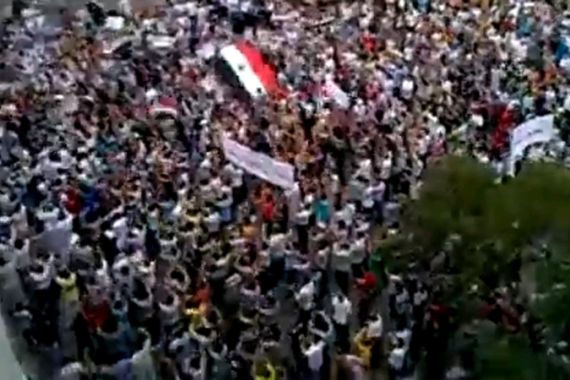More deaths in Syria as sanctions tighten
At least 12 people killed by security forces in post-prayer protests as EU steps up sanctions against government.

At least 12 protesters have been killed in locations across Syria by security forces who opened fire on anti-government demonstrations, activists told Al Jazeera.
As protests were staged on what activists named the “Friday of opposition unity”, eight people were killed in the central province of Homs and one in Damascus.
Three others, including a seven-year-old boy, were injured when security forces shot at a protesters in the Deir Balba neighbourhood of Homs, which has been a major protest hub.
An activist in the Homs town of al-Rastan, has told Al Jazeera that about 50,000 people have taken to the streets calling for the downfall of Syria’s ruling Baath party.
At least one person was shot and injured as security forces, backed by armoured vehicles, opened fire on protesters leaving the Omar al-Khatab mosque in al-Rastan, a witness said.
Hundreds of protesters also took to the streets of the Damascus suburb of Qabun, chanting against the Iranian government and Hezbollah, the Lebanese group which activists claim supports the Syrian government’s crackdown.
“Not Iran and not Hezbollah, we want people who fear God,” chanted a group of protesters carrying banners calling for international protection.
In Hama, scene of the largest anti-government protests since the uprising began, a resident told Al Jazeera that the city has now become “a military base” since security forces laid siege to it.
“There are soldiers and security men and checkpoints everywhere, even in small districts and narrow streets,” said Omran, a protester from Hama.
Faced with expanding street demonstrations demanding an end to 41 years of the ruling Baath party, the Syrian government has sent troops and tanks into many cities and towns to quell the nationwide uprising.
“We have seen more of an all-out effort to crush Homs. But the city is big and its countryside has also risen,” an activist said.
Protesters also came under fire on Friday in the southeastern province of Deir el-Zor, the city of Hama and in several Damascus suburbs, activists said.
Bashar al-Assad, the Syrian president, blames foreign elements and armed groups for being behind the uprising, but Syrian opposition groups deny the claim.
Assad, a member of the country’s minority Alawite sect, has ruled the predominantly Sunni Muslim country since inheriting power from his late father, Hafez al-Assad, 11 years ago.
Girl ‘killed’
Amnesty International, meanwhile, said it had uncovered evidence that an 18-year-old girl, whose mutilated body was discovered in a Homs mortuary last week two months after her arrest, was the first woman to have died in custody during the uprising.
Zainab’s body had been decapitated and the arms and skin removed, the report said.
The London-based group said the family of Zainab al-Hosni, who was reportedly abducted by Syrian authorities in July, discovered her body “by chance” while collecting the body of her brother, who was also apparently tortured and killed in detention.
The findings brought Amnesty’s number of reported deaths in custody to 103 since the protests started.
According to the Strategic Research and Communication Centre, a rights group, almost 3,500 civilians, including 217 children, have been killed by Syrian security forces since protests began in March.
Separately, Syrian troops who defected to the opposition have clashed with pro-government security forces in Damascus suburbs, in an attempt to protect protesters, sources have told Al Jazeera.
European sanctions
The latest deaths came as both the European Union and Switzerland announced they were widening sanctions against the Syrian government over its deadly crackdown on dissent.
The European Union banned new investments in the oil sector and prohibited the delivery of banknotes to the Syrian central bank.
“The EU restrictive measures are designed to have maximum impact on the Syrian regime, while minimising any potential negative impacts on the Syrian population,” Catherine Ashton, the EU’s foreign policy chief, said in Brussels.
The 27-member bloc also added two individuals and six companies to a list of people and entities facing an assets freeze and travel ban, a diplomat said on condition of anonymity.
The new measures, the seventh set of EU sanctions imposed to punish Assad’s regime for its relentless crackdown, will come into force on Saturday.
Earlier this month, the EU adopted a ban on crude oil imports expected to hit Damascus hard, as the EU buys 95 per cent of Syrian oil exports, providing one-third of the government’s funds.
Switzerland also announced on Friday that it was imposing an embargo on the import, sales and transport of Syrian oil and oil products.
“Due to the relentless repression imposed by the Syrian security forces, the Federal Council has decided to tighten sanctions against Syria,” said the Swiss economy ministry in a statement. Its sanctions will also take effect on Saturday.